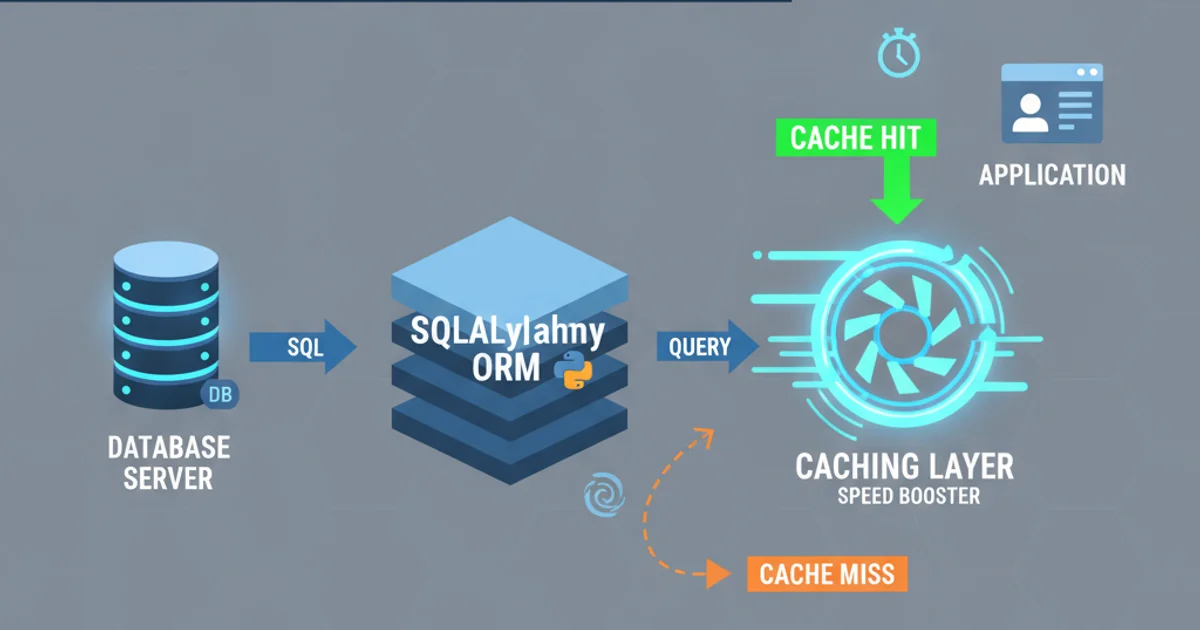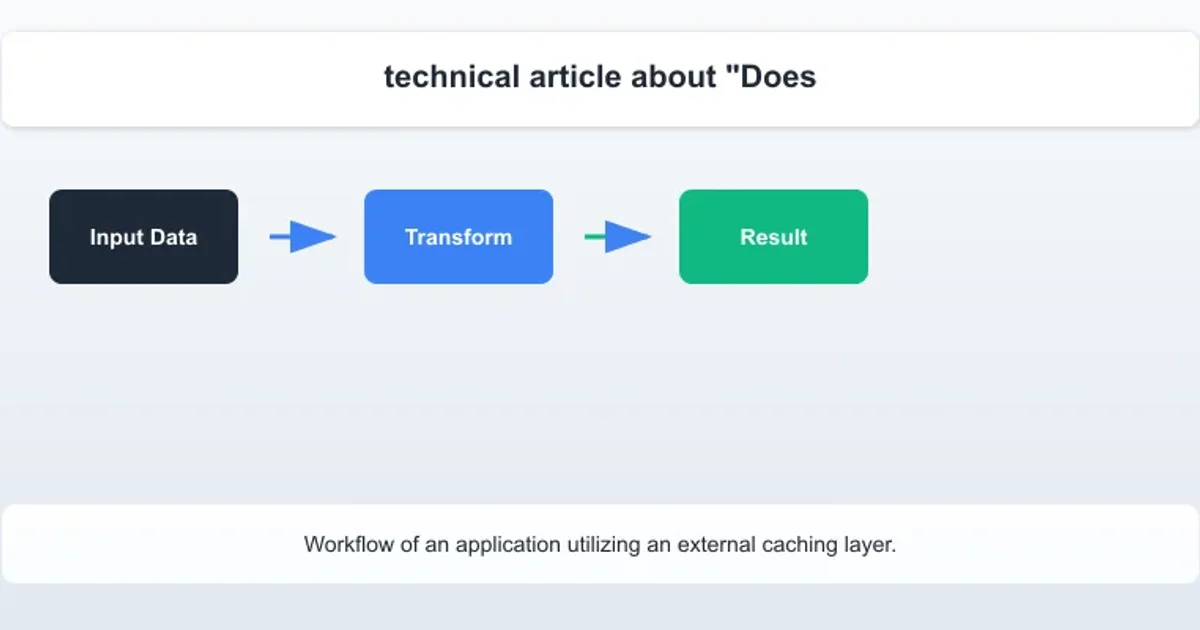Does SQLAlchemy support caching?
Categories:
Implementing Caching Strategies with SQLAlchemy

Explore how to integrate caching mechanisms with SQLAlchemy to improve application performance, reduce database load, and enhance user experience. This article covers various caching approaches and their practical implementation.
Caching is a critical technique for optimizing application performance by storing frequently accessed data in a faster, more accessible location than the primary data source (e.g., a database). When dealing with Object-Relational Mappers (ORMs) like SQLAlchemy, effective caching can significantly reduce database queries, improve response times, and scale applications more efficiently. While SQLAlchemy itself doesn't provide an out-of-the-box, comprehensive caching solution for query results, it offers mechanisms that facilitate integration with external caching libraries. This article will guide you through understanding how to leverage SQLAlchemy's features to implement robust caching strategies.
Understanding SQLAlchemy's Caching Landscape
SQLAlchemy's core design focuses on database interaction and ORM capabilities rather than acting as a caching layer. It does, however, have an internal identity map that caches objects within a session. This means that if you query for the same object (by primary key) multiple times within the same session, SQLAlchemy will return the same Python object without hitting the database again. This is an important, but limited, form of caching.
For broader caching needs, such as caching query results across sessions or caching complex computed data, you need to integrate external caching libraries. Popular choices include Dogpile, Redis, Memcached, and Beaker. These libraries provide the infrastructure to store and retrieve cached data, while SQLAlchemy provides the hooks to invalidate or refresh that cache.
Integrating External Caching with Query Results
The most common caching requirement is to store the results of expensive database queries. This can be achieved by wrapping SQLAlchemy queries with a caching decorator or by explicitly managing the cache before executing a query. Libraries like Dogpile provide excellent integration points for this purpose.
Let's consider a scenario where we want to cache the results of a query that fetches a list of frequently accessed products. We can use Dogpile's region object to define a caching region and then apply it to our query execution.
from sqlalchemy import create_engine, Column, Integer, String
from sqlalchemy.orm import sessionmaker
from sqlalchemy.ext.declarative import declarative_base
from dogpile.cache import make_region
from dogpile.cache.api import NO_VALUE
# 1. Setup SQLAlchemy
engine = create_engine('sqlite:///:memory:')
Base = declarative_base()
Session = sessionmaker(bind=engine)
class Product(Base):
__tablename__ = 'products'
id = Column(Integer, primary_key=True)
name = Column(String)
price = Column(Integer)
def __repr__(self):
return f"<Product(id={self.id}, name='{self.name}', price={self.price})>"
Base.metadata.create_all(engine)
# Populate some data
session = Session()
session.add_all([
Product(name='Laptop', price=1200),
Product(name='Mouse', price=25),
Product(name='Keyboard', price=75)
])
session.commit()
session.close()
# 2. Setup Dogpile Cache Region
# For simplicity, using a memory backend. In production, use Redis/Memcached.
cache_region = make_region().configure(
'dogpile.cache.memory'
)
# 3. Define a cached query function
@cache_region.cache_on_arguments()
def get_all_products_cached():
print("--- Executing database query for all products ---")
session = Session()
products = session.query(Product).all()
session.close()
return products
# 4. Test the caching
print("First call (should hit DB):")
products1 = get_all_products_cached()
print(products1)
print("\nSecond call (should hit cache):")
products2 = get_all_products_cached()
print(products2)
print("\nThird call (should hit cache):")
products3 = get_all_products_cached()
print(products3)
# Example of invalidating cache (if needed)
# cache_region.invalidate(get_all_products_cached)
# print("\nFourth call after invalidation (should hit DB again):")
# products4 = get_all_products_cached()
# print(products4)
Example of caching SQLAlchemy query results using Dogpile.cache.

Workflow of an application utilizing an external caching layer.
Caching Individual Objects and Relationships
Beyond full query results, you might want to cache individual SQLAlchemy objects or specific relationships. This is particularly useful for objects that are frequently accessed by their primary key but rarely change. While Dogpile can cache function results, for object-level caching, you might integrate with a dedicated object cache or use a pattern where you first check the cache for an object before querying the database.
Consider a User object that is frequently looked up by id. Instead of always querying the database, we can implement a get_user_by_id function that first checks a cache.
from sqlalchemy import create_engine, Column, Integer, String
from sqlalchemy.orm import sessionmaker
from sqlalchemy.ext.declarative import declarative_base
from dogpile.cache import make_region
from dogpile.cache.api import NO_VALUE
# Setup SQLAlchemy (same as before)
engine = create_engine('sqlite:///:memory:')
Base = declarative_base()
Session = sessionmaker(bind=engine)
class User(Base):
__tablename__ = 'users'
id = Column(Integer, primary_key=True)
name = Column(String)
email = Column(String)
def __repr__(self):
return f"<User(id={self.id}, name='{self.name}')>"
Base.metadata.create_all(engine)
# Populate some data
session = Session()
session.add_all([
User(name='Alice', email='alice@example.com'),
User(name='Bob', email='bob@example.com')
])
session.commit()
session.close()
# Setup Dogpile Cache Region for objects
user_cache_region = make_region().configure(
'dogpile.cache.memory',
expiration_time=3600 # Cache for 1 hour
)
def get_user_by_id(user_id):
cache_key = f"user:{user_id}"
user = user_cache_region.get(cache_key)
if user is NO_VALUE:
print(f"--- User {user_id} not in cache, querying DB ---")
session = Session()
user = session.query(User).get(user_id)
session.close()
if user:
user_cache_region.set(cache_key, user)
else:
print(f"--- User {user_id} found in cache ---")
return user
# Test object caching
print("First call for User 1 (should hit DB):")
user1_a = get_user_by_id(1)
print(user1_a)
print("\nSecond call for User 1 (should hit cache):")
user1_b = get_user_by_id(1)
print(user1_b)
print("\nFirst call for User 2 (should hit DB):")
user2_a = get_user_by_id(2)
print(user2_a)
Caching individual SQLAlchemy objects by primary key.
Advanced Caching with CherryPy and Beaker
For web applications, especially those built with frameworks like CherryPy, integrating a caching solution like Beaker can provide session management, request-level caching, and even full-page caching. Beaker can be configured to use various backends (memory, file, Redis, Memcached) and offers decorators for easy integration.
While Beaker can cache arbitrary Python objects, its primary use case with SQLAlchemy often involves caching entire view responses or specific data structures that are derived from SQLAlchemy queries, rather than directly caching SQLAlchemy ORM objects themselves. This is because Beaker's strength lies in its web-context awareness.
Here's a conceptual example of how Beaker might be used in a CherryPy application to cache a view's output that relies on SQLAlchemy data:
import cherrypy
from beaker.middleware import SessionMiddleware, CacheMiddleware
from beaker.cache import CacheManager
from beaker.util import parse_cache_config_options
from sqlalchemy import create_engine, Column, Integer, String
from sqlalchemy.orm import sessionmaker
from sqlalchemy.ext.declarative import declarative_base
# SQLAlchemy Setup (same as previous examples)
engine = create_engine('sqlite:///:memory:')
Base = declarative_base()
Session = sessionmaker(bind=engine)
class Item(Base):
__tablename__ = 'items'
id = Column(Integer, primary_key=True)
name = Column(String)
def __repr__(self):
return f"<Item(id={self.id}, name='{self.name}')>"
Base.metadata.create_all(engine)
session = Session()
session.add_all([
Item(name='Apple'),
Item(name='Banana'),
Item(name='Cherry')
])
session.commit()
session.close()
# Beaker Cache Configuration
cache_opts = {
'cache.type': 'memory',
'cache.expire': 300 # Cache for 5 minutes
}
cache_manager = CacheManager(**parse_cache_config_options(cache_opts))
class MyWebApp:
@cherrypy.expose
@cache_manager.cache('list_items_cache', expire=60) # Cache this method for 60 seconds
def list_items(self):
print("--- Fetching items from database (or cache if hit) ---")
session = Session()
items = session.query(Item).all()
session.close()
item_names = [item.name for item in items]
return f"<h1>Cached Items List</h1><p>{', '.join(item_names)}</p>"
@cherrypy.expose
def index(self):
return "Welcome to the caching example! <a href='/list_items'>List Items</a>"
if __name__ == '__main__':
config = {
'/': {
'tools.sessions.on': True,
'tools.sessions.timeout': 60
}
}
# Apply Beaker CacheMiddleware to the CherryPy application
app = cherrypy.Application(MyWebApp(), '/', config=config)
app = CacheMiddleware(app, cache_opts)
cherrypy.quickstart(app)
# To run this example:
# 1. pip install cherrypy beaker sqlalchemy
# 2. Save as a Python file (e.g., app.py)
# 3. Run: python app.py
# 4. Open browser to http://127.0.0.1:8080/list_items
# Refresh the page multiple times to see cache hits/misses based on expire time.
Using Beaker's CacheMiddleware and method decorator for caching in a CherryPy application with SQLAlchemy.